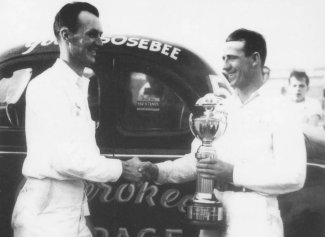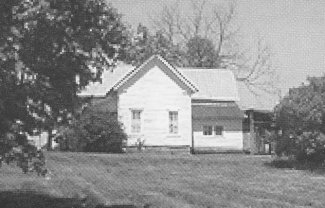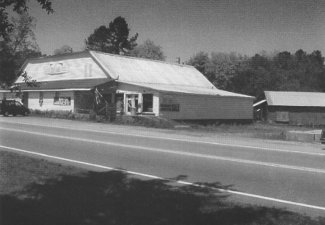
Billie Hester (left) and Gober Sosebee (right) following a win at Daytona Beach in 1950. Both are now in the Georgia Racing Hall of Fame.
By Eddie Samples
Posted in Feature Stories 3/24/12
Georgia’s Billie “Sunday” Hester was named after the famous American evangelist Billy Sunday, whose preaching against the selling of liquor made him a major player in the passage of the Eighteenth Amendment (prohibition) in 1919.
Our Billie Sunday lives by the same ethics…to a degree.
“I never made the stuff nor allowed it in my garage,” he said recently. “I told my mechanics you could sit on my workbench and use it as a toilet, but don’t ever sit a bottle of liquor there. Times were I’d work on trip cars for friends but they had to come in unloaded.”
Born in Atlanta, Georgia on May 11, 1915, Billie lived with his family on North Avenue until 1925, when, at ten, they loaded up and moved further north to Lathemtown, north of Atlanta.
“We looked like the Beverly Hillbillies going up Highway 19 with my brothers, sisters and furniture piled in our Model T truck,” he told us. In Atlanta his father had operated a streetcar for Georgia Railway and Power Company but with so many children he felt a need to be back home in the fodder fields.
Billie had a knack for repairing things.
“As a kid still in Atlanta I worked relining brakes on T-Models. You had to get your hands in small places, which is tedious work. I only got paid a dime a car but I just loved fooling with ’em.”
He loved tinkering with machinery so much that he wired his father’s house when they got to Lathemtown.

In 1925, this was Billie Hester's home at Lathemtown. It's still there today off Highway 362.
“Worse mistake I ever made,” he said. “I took a three valve one cylinder T-model engine and made a baffle to keep the oil in because of no transmission. I put on a pulley and hooked up six 6-volt batteries and a string of 32-watt bulbs. I got so excited I wired the barn and the corncrib. My dad, being a workaholic, saw this as a good thing and had us kids shucking corn half the night.”
Lathemtown is where Billie met his wife, Katie Belle Lathem. Her grandfather Will established the little settlement on Highway 20 just east of Canton, the seat of Cherokee County.
“Walking to school everyday through woods and down dirt roads I had plenty of time to explain to her what was on my mind. I told Katie she was the smartest, prettiest and sweetest girl I’d ever met, and that I was going to marry her.” Billie was ten years old. Ten years later he did just that.
The first real job he had was working for the Lathems. They sold feed, seed and everything else at their store, plus they had the cotton gin in the back.
“Whatever they wanted done, I could handle it; mostly working on their trucks and machinery. You didn’t really get paid. If you needed money you just asked for it and got put in the books. Mr. Lathem had nickels, dimes and quarter bills printed for money. Add in bartering and a few ‘I.O.U’s and you had your own system of finance.”

Now a drapery shop and workshed in back, the old Lathemtown store and cotton gin, respectively, still stands. Busy Hwy. 20 connects Canton to Cumming. It was once a dirt road surrounded by farms.
Billie mentioned that, “the Lathems were good people and did a lot for the locals. I know they were hooked up with the Jones’ family of Canton, who owned everything. If you bought something in Canton, you probably bought it from a Jones. I know we’d get fertilizer from them in the spring, and pay ’em back with cotton in the fall.”
Billie married Katie Belle in 1935 when he was twenty.
“There in Lathemtown you had drilled wells and a string of homes on electricity. A lot of family members lived together. Katie and I lived with my sister and her husband. Rent was $5 a month and that’s how you got by on a buck a day,” he said. Plus Billie made extra money working on cars out of the family barn.
His first real “real” job outside of Lathemtown was with future racing star Jack Smith’s father Carl.
“Lee Smith was Jack’s grandfather and a great guy,” Billie said. “He built Carl a two stall garage but he never really used it. Carl did get a job at Brady’s Chevrolet in Alpharetta in 1935 and I went to work with him for $10 a week. Bad mistake. The home folks knew I wasn’t that fond of Carl and his work ethics, and told me I’d obviously do anything to get out of ‘Foddersville,” he laughed. “Going out in the fields and pulling and drying fodder (cornstalks) for those animals all day was a bit much. So any job in town was a better deal.”
